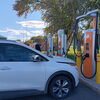Processing Your Payment
Please do not leave this page until complete. This can take a few moments.
- News
-
Editions
View Digital Editions
Biweekly Issues
- December 1, 2025
- Nov. 17, 2025
- November 03, 2025
- October 20, 2025
- October 6, 2025
- September 22, 2025
- + More
Special Editions
- Lists
- Viewpoints
-
Our Events
Event Info
Award Honorees
- Calendar
- Biz Marketplace
Humanizing robots and drones
I've long been a fan of R2-D2 and other movie robots. As a reporter, I've always jumped at the chance to cover researchers making prototype robots. The idea of what robots could potentially do to improve the world piques the imagination.
And I'm not alone. When keynote speaker Sampriti Bhattacharyya of Hydroswarm in Cambridge, Mass., showed her EVE prototype underwater drone at June's Maine Startup & Create Week in Portland, the house was packed. At some point in the future, Bhattacharyya hopes legions of EVEs in a sensor network will protect U.S. ports and even measure ocean characteristics as the world's climate changes.
While sci-fi robots often have been depicted as terrifying or evil, like Gort from the 1951 classic “The Day the Earth Stood Still,” and drones often are linked to warfare, many of today's robots and drones are being developed for humanitarian purposes.
Take Nigel Gifford, an engineer who sold his solar satellite company Ascenta to Facebook for about $20 million. His newest venture at United Kingdom company Windhorse Aerospace, according to Business Insider, is a potentially edible drone called the Pouncer that he hopes can be dropped very accurately into disaster zones and serve as emergency food rations.
Its wings would be edible, and compartments in its body would be filled with different foods even tailored for local tastes. The drone's wooden structure could be used for heating and cooking.
Seems a lot simpler, more accurate and less wasteful than boxes of food dropped by parachute by military planes, Gifford tells Business Insider. He says he got the idea from skydiving, one of the many adventures he enjoys.
While Pouncer is a way off from being a reality, it's the kind of entrepreneurial thinking that can be both business and humanitarian. It's the kind of thinking, and bootstrapping, for which Mainers are known.
Another example is the rise of miniaturized farm machinery in the form of robots. A series of articles in “Food is the New Internet” talked about how such small machinery could help encourage small, diverse farms, a trend in Maine we've written about frequently in Mainebiz.
Take the Rowbot, a lawn-mower sized robot from a Minneapolis company of the same name that can fertilize soil, mulch weeds and sow crops on its own on 50 acres each day. That's a real helping hand for a small farmer. Today's typical planters are only affordable to the largest farms and can plant 64 rows of corn, but are so heavy they compact the soil.
And perhaps not surprisingly, there's Hello Tractor, a startup based in Washington, D.C., and Nairobi, Kenya, that calls itself the “Uber” of farm machinery because farmers can request farm machinery and have it dropped off. While farmers do buy the tractor, they can rent it out during downtimes. Each tractor has a GPS antenna so Hello Tractor can track the location of the tractor and even alert the owner when it needs maintenance.
Hello Tractor became a trendy topic at this year's SXSW conference in Austin, Texas, in March. The founder and CEO of Hello Tractor, Jehiel Oliver, actually is a city man from Cleveland who several years ago became interested in issues of the global poor, including food and farming.
Again, this is an idea that could work on small farms in Maine. Entrepreneurship doesn't always have to be the big light bulb moment. Often it comes by thinking big about small developments.
Read more
Learning beyond the classroom at King Middle School's makerspace
Chainsaw-wielding robots? Just another day at Howe & Howe Technologies
Will Maine Startup and Create Week spark an 'innovator invasion'?
Mainebiz web partners

The Giving Guide
The Giving Guide helps nonprofits have the opportunity to showcase and differentiate their organizations so that businesses better understand how they can contribute to a nonprofit’s mission and work.
Learn More
Work for ME
Work for ME is a workforce development tool to help Maine’s employers target Maine’s emerging workforce. Work for ME highlights each industry, its impact on Maine’s economy, the jobs available to entry-level workers, the training and education needed to get a career started.
Learn More
Groundbreaking Maine
Whether you’re a developer, financer, architect, or industry enthusiast, Groundbreaking Maine is crafted to be your go-to source for valuable insights in Maine’s real estate and construction community.
Learn more-
The Giving Guide
The Giving Guide helps nonprofits have the opportunity to showcase and differentiate their organizations so that businesses better understand how they can contribute to a nonprofit’s mission and work.
-
Work for ME
Work for ME is a workforce development tool to help Maine’s employers target Maine’s emerging workforce. Work for ME highlights each industry, its impact on Maine’s economy, the jobs available to entry-level workers, the training and education needed to get a career started.
-
Groundbreaking Maine
Whether you’re a developer, financer, architect, or industry enthusiast, Groundbreaking Maine is crafted to be your go-to source for valuable insights in Maine’s real estate and construction community.
ABOUT
NEW ENGLAND BUSINESS MEDIA SITES
No articles left
Get access now
In order to use this feature, we need some information from you. You can also login or register for a free account.
By clicking submit you are agreeing to our cookie usage and Privacy Policy
Already have an account? Login
Already have an account? Login
Want to create an account? Register
Get access now
In order to use this feature, we need some information from you. You can also login or register for a free account.
By clicking submit you are agreeing to our cookie usage and Privacy Policy
Already have an account? Login
Already have an account? Login
Want to create an account? Register







Comments